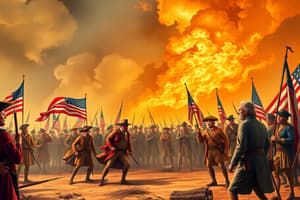Podcast
Questions and Answers
What was the primary reason the 13 colonies sought to break away from British rule?
What was the primary reason the 13 colonies sought to break away from British rule?
- Increasing oppression and corruption. (correct)
- Disagreements with the British Royal Family.
- Unfair labor practices in the colonies.
- Desire to establish a monarchy.
Who was the primary author of the Declaration of Independence?
Who was the primary author of the Declaration of Independence?
- John Dickenson
- Thomas Jefferson (correct)
- Benjamin Franklin
- George Washington
What was a major weakness of the Articles of Confederation, which led to its replacement?
What was a major weakness of the Articles of Confederation, which led to its replacement?
- Lack of a judicial branch.
- Too much power given to the national government.
- Inability to elect a President.
- Weak national government causing economic problems. (correct)
Which state did not send a representative to the Constitutional Convention in 1787?
Which state did not send a representative to the Constitutional Convention in 1787?
What was the main result of the Constitutional Convention of 1787?
What was the main result of the Constitutional Convention of 1787?
Flashcards
Declaration of Independence
Declaration of Independence
The document that declared the 13 colonies' independence from British rule, written in 1776 by Thomas Jefferson.
Articles of Confederation
Articles of Confederation
The first constitution of the United States, established in 1776, which gave more power to the states than the federal government.
Constitutional Convention
Constitutional Convention
A meeting held in 1787 to revise the Articles of Confederation, resulting in the creation of the United States Constitution.
Three Branches of Government
Three Branches of Government
Signup and view all the flashcards
The U.S. Constitution
The U.S. Constitution
Signup and view all the flashcards
Study Notes
Revolutionary War and the Birth of the U.S. Constitution
- In 1776, after 167 years of British rule, the 13 colonies sought independence due to perceived oppression and corruption.
- Thomas Jefferson drafted the Declaration of Independence in Philadelphia.
- The Articles of Confederation, the first U.S. Constitution, were written in 1777 by John Dickinson.
- The Articles of Confederation proved weak, leading to economic hardship and disputes over territory, pensions, taxes, and trade.
Constitutional Convention of 1787
- The Constitutional Convention was held in 1787 at the State House, excluding Rhode Island.
- Representatives from all states except Rhode Island attended.
- The convention aimed to replace the existing government.
- Delegates decided on a new structure with a strong central government sharing power with three branches.
Three Branches of Government
- The legislative branch, controlled by Congress (House of Representatives), creates laws.
- The executive branch, headed by the President, Vice President, and Cabinet, enforces laws.
- The judicial branch, composed of the Supreme Court and Federal Courts, interprets laws.
Lasting Impact of the Constitution
- The U.S. Constitution, though established thousands of years ago, remains a strong and flexible framework.
Studying That Suits You
Use AI to generate personalized quizzes and flashcards to suit your learning preferences.




